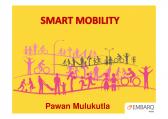
Pawan Mulukutla
According to a McKinsey study, India’s urban population is expected to grow from 340 million to 590 million people between 2008 and 2030. In response to this rapid urbanization, Prime Minister has announced that he will build 100 smart cities across the country. “Smart” cities typically use information technology to anticipate and address urban problems.
This presentation focuses on how mobility plays an integral role in the planning and development of a smart city. While smart technology can help improve sustainable transport, technology alone cannot ensure sustainable mobility. The presentation discusses some of the key policy elements of successful sustainable mobility. For cities to truly be “smart,” planners must use these strategies to emphasize moving people. While older cities can be retrofitted to become smart cities, in many cases, smart cities will be built entirely from scratch. This allows planners to anticipate and address potential urban challenges without being locked-in by existing infrastructure, giving them the opportunity to design cities around sustainable mobility strategies that have been shown to improve quality of life in cities worldwide.
This presentation was made by EMBARQ India at a conference on "Smart Cities" at IIT Madras in October, 2014. If you have any questions or comments or would like to know more about the subject, contact Pawan Mulukutla at pawan.mulukutla@wri.org.
